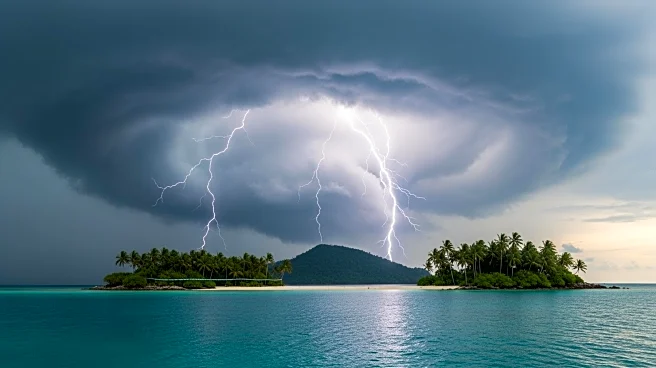What's Happening?
Tropical Storm Melissa is forecasted to strengthen into a major hurricane over the weekend, posing significant threats to the Caribbean region, particularly the Dominican Republic, Haiti, and Jamaica. The storm is expected to become a Category 4 hurricane by
Sunday, bringing heavy rain, destructive winds, and potentially catastrophic flash flooding and landslides. As of Friday evening, Melissa was located approximately 215 miles southeast of Kingston, Jamaica, moving at a slow pace of 2 mph, which is anticipated to continue for several days, allowing for further intensification. The storm has already resulted in the death of an elderly man in Haiti due to a downed tree. Meteorologists predict that Melissa could be the strongest hurricane to impact Jamaica in over 35 years, reminiscent of Hurricane Gilbert in 1988.
Why It's Important?
The intensification of Tropical Storm Melissa into a major hurricane holds significant implications for the Caribbean region, particularly for Jamaica, Haiti, and the Dominican Republic. The slow movement and potential multi-day impact of the storm could lead to extensive wind damage, widespread power outages, and severe flooding. The expected rainfall of 15-25 inches in parts of Haiti and Jamaica could result in life-threatening flash floods and landslides, posing serious risks to communities and infrastructure. The economic and social disruption caused by such a powerful storm could be substantial, affecting tourism, agriculture, and local economies. Emergency services and disaster response teams in the region are likely to face considerable challenges in managing the aftermath and ensuring the safety of residents.
What's Next?
As Tropical Storm Melissa continues to intensify, authorities in the affected regions are likely to issue evacuation orders and prepare for emergency response operations. The slow movement of the storm suggests that it could remain a major hurricane for several days, necessitating prolonged efforts to mitigate its impact. Governments and disaster management agencies will need to coordinate closely to provide relief and support to affected communities. The international community may also offer assistance in terms of humanitarian aid and resources to help with recovery efforts. Monitoring the storm's progression and adjusting forecasts will be crucial in ensuring timely and effective responses to minimize damage and protect lives.
Beyond the Headlines
The potential impact of Tropical Storm Melissa highlights the vulnerability of Caribbean nations to extreme weather events, exacerbated by climate change. The increasing frequency and intensity of hurricanes in the region underscore the need for improved infrastructure, disaster preparedness, and climate resilience strategies. Long-term investments in sustainable development and climate adaptation could help mitigate the effects of such natural disasters in the future. Additionally, the storm serves as a reminder of the importance of international cooperation in addressing climate-related challenges and supporting vulnerable communities.

















